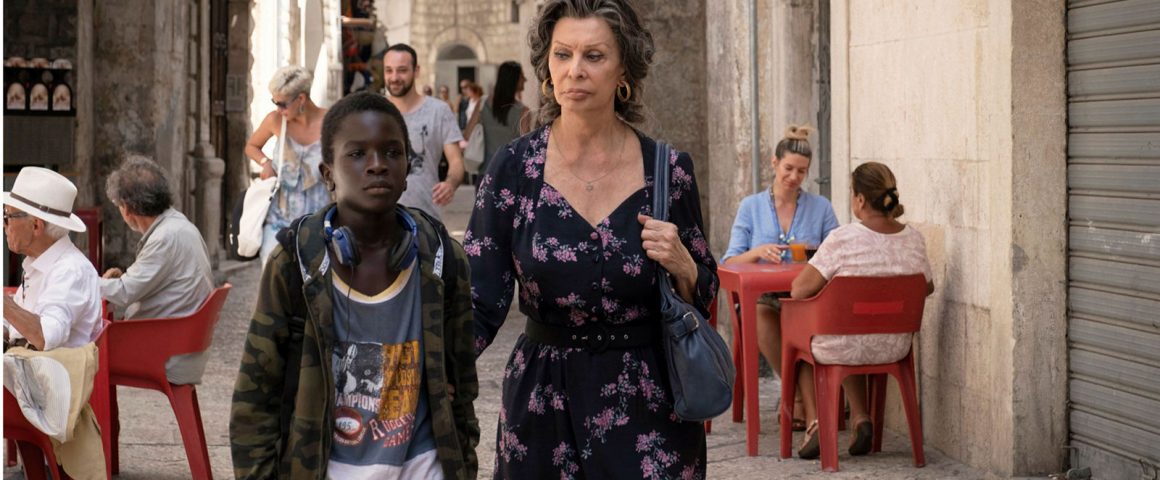Edoardo Ponti (“Coming & Going”) has provided his mother, the great Sophia Loren (“Nine”), with her ninety-eighth film credit and her first starring role in 16 years in The Life Ahead (La vita davanti a sé), a sincere if somewhat flawed look at the relationship between an orphaned Muslim boy from Senegal and an aging Holocaust survivor and former sex worker. Adapted from the novel “Promise at Dawn” by Romain Gary, and modeled after the 1977 film “Madame Rosa” (which won an Academy Award for Best Foreign Film), the story is set in Bari, Italy, a small picturesque city bathed in the sunlight of the Mediterranean, gorgeously filmed by cinematographer Angus Hudson (“You Should Have Left”).
Updated with references to illegal immigration and transgender relationships to give it a more contemporary feel, the film has excellent performances, especially from Loren who still maintains her stately beauty and comedic charm, though much of it is hidden by a grey wig and a scowl on her face as befits the character. While the film has moments that testify to the strength of the human spirit, its unwillingness to explore deeper aspects of its characters beyond what appears on the surface does not serve the film well. The screenplay by director Edoardo Ponti and Ugo Chiti (“Dogman”) (with collaborations from Fabio Natale, “Drive me Home”), is not short on empathy for those who carry physical and mental wounds, but falls short of truly connecting on an emotional level.
Over the years, Rosa (Loren) has been a foster mother for the children of prostitutes, currently looking after two, a boy studying Hebrew to prepare for his Bar Mitzvah and the other left by Lola (Abril Zamora, “Who Would You Take to a Deserted Island?”), her transgender neighbor and friend. Rosa agrees (for $750) to take in the 12-year-old Momo (short for Mohammed) (Ibrahima Gueye) after a request from Dr. Coen (Renato Carpentieri, “Hammamet”), a kindly man who became the boy’s guardian after a “tragedy.” He now thinks Momo, who imagines being friends with a magical lioness, would benefit from having a strong maternal figure in his life rather than relying on the system of social services.
The film then flashes back to Momo’s theft of Madame Rosa’s shopping bag at an outdoor market and his forced return of the item by Doctor Coen, though the boy can barely say the word “sorry.” Rosa is only vaguely aware of the task she has undertaken as Momo, at first, is a rebellious and uncommunicative boy who works the streets as a drug dealer for local kingpin Ruspa (Massimiliano Rossi, “The Bad Poet”), uncommonly portrayed as just another day job. In a sporadic but mostly ineffective voiceover, Momo says at the beginning, “Some say that everything is written, that you can’t change anything,” and we see Momo locking himself into the basement of an old apartment building.
He is scruffy and foul-mouthed but there is a beating heart and some charm underneath his tough veneer that is reminiscent of Zain in Labecki’s “Capernaum,” another lost boy who lives on the streets. Even with the mentoring efforts of Mr. Hamil (Babak Karimi, “The Salesman”), a gentle Muslim storekeeper who Rosa enlists to serve as a kind of father figure to Momo, the boy continues to work the streets. “I’m not going to suck up to happiness,” he says, “If it shows up, great.” Though Madame Rosa’s task is daunting and her advanced age and growing dementia is a severe limitation, she believes her personal strength developed through her own traumas can help.
Momo has a long way to go to learn to accept his new environment, but his best moments are not when he is playing the tough guy, but when he rides his bike through busy streets with a broad smile on his face and when he dances wildly at a party where he expresses his pent-up feelings with unrestrained exuberance. Frequently drifting away from reality, Rosa tells Momo about a secret room to which she often retreats to make her feel safe. “In Auschwitz,” she says, “I would hide under the floorboards,” but the increasingly blank looks on her face tell a deeper story. Though Momo’s antagonistic relationship with Rosa and others in the home has changed, his sudden caring for the increasingly ill Rosa feels too abrupt to be convincing and an unwelcome spoonful of feel-good melodrama, underscored by the music of Gabriel Yared (“Judy”), does not help the medicine go down, even with the assistance of a Diane Warren ballad to smooth the way.




'Movie Review: The Life Ahead (2020)' has no comments